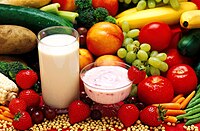
Photo from wikipedia
The purpose of the current study was to investigate the effect of choline as a means of increasing docosahexaenoic acid (22:6 n-3, DHA) deposition in egg yolks of hens fed… Click to show full abstract
The purpose of the current study was to investigate the effect of choline as a means of increasing docosahexaenoic acid (22:6 n-3, DHA) deposition in egg yolks of hens fed a high-DHA microalgae product. Fifty-six, 26-wk-old, White Leghorn hens were kept in individual cages and randomly allocated to 1 of 4 dietary treatments, each with 7 replicate groups of 2 hens (n = 7 per treatment). The experimental diets were corn and soybean meal based, with 0% microalgae (control), 1% microalgae and no additional choline chloride (Alg), and Alg plus choline chloride at 0.1% (Ch0.1) and 0.2% (Ch0.2). The feeding trial lasted 16 wk. The data were fit as a general linear mixed model to generate least square means in response to diet. Variables measured multiple times during the study were fit as repeated measures. Using orthogonal contrasts, Alg was compared to control, and Ch0.1 and Ch0.2 were compared separately to Alg. Ch0.1 increased hen day egg production (P < 0.05) and Haugh unit (P < 0.05), and reduced feed conversion ratio (P < 0.05) compared to Alg, but Ch0.2 did not. Alg increased egg DHA (P < 0.001), phosphatidylethanolamine (P < 0.05), and phosphatidylcholine (P < 0.001) compared to control, but Ch0.1 or Ch0.2 had no effect compared to Alg (P > 0.05). In the liver, Alg increased lipid peroxidation products compared to control (P < 0.01), and Ch0.1 reduced them compared to Alg (P < 0.01). Both Ch0.1 and Ch0.2 increased hepatic concentrations of γ- (P < 0.05; P < 0.001) and α-tocopherol (P < 0.01; P < 0.001), and Ch0.1 increased γ-tocopherol concentration in eggs compared to Alg (P < 0.05). The results from the current study suggest that supplemental choline chloride in hen diets containing microalgae can improve production performance and egg quality, and protect the liver from oxidative stress.
Journal Title: Poultry science
Year Published: 2019
Link to full text (if available)
Share on Social Media: Sign Up to like & get
recommendations!